REMEMBERING LEONG HO CHIEW
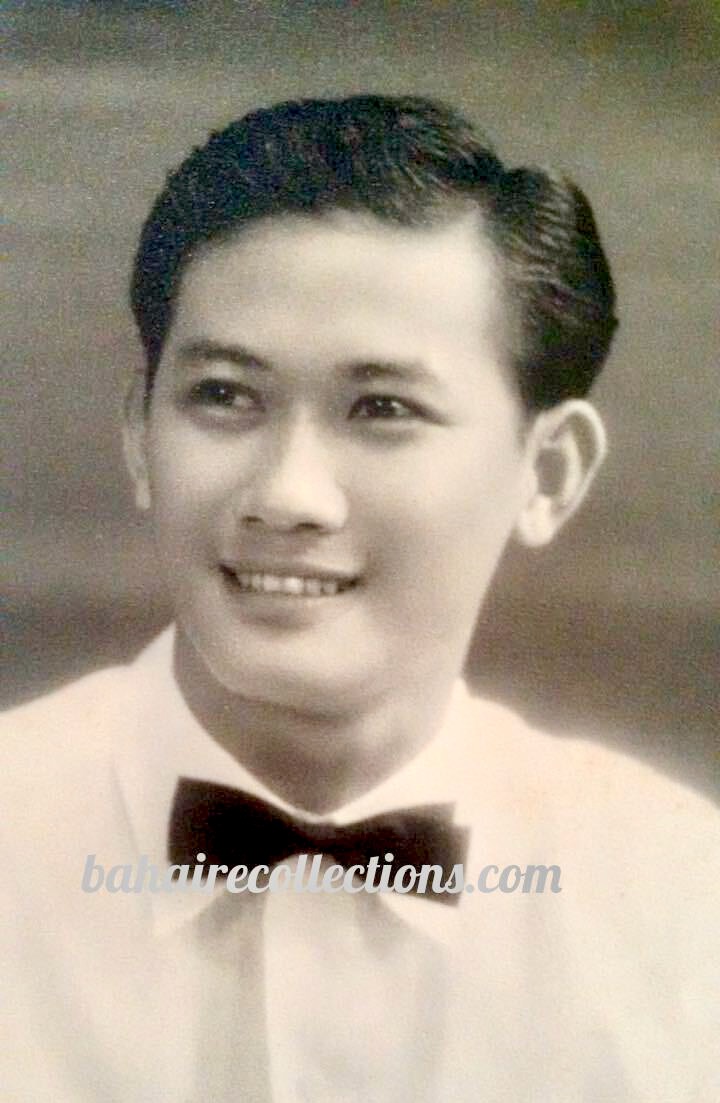
29 December 1934 to 21 July 1997
Reading the life of Leong Ho Chiew, one is naturally led to the firm belief that he must have been created for a special role in the history of the Cause in Malaysia. He was an early believer who accepted the Faith during the Ten-Year Crusade period and attained a high position in his profession, which enabled him to defend the nation, the Cause and the community on various occasions. His was a path less traveled.
Leong Ho Chiew or Ho Chiew as he was fondly addressed, is the eldest among the seven children of Leong Tat Chee, who was the first Auxiliary Board member in Malaya and the only delegate from Malaya to participate in the election of the first House of Justice in 1963 and who represented the Chinese race at the First Bahá’í World Congress in London. These, being among the long list of accolades that decorated his colorful Bahá’í life. Following his father’s footsteps, Ho Chiew had his own unique roles to play, indifferent, and yet effective and impactful ways.
Ho Chiew was always addressed by his siblings as “brother,” in the traditional Chinese way, and never by his first name. He was indeed a good and loving brother and supporter of every one of his siblings. When his parents had a near-fatal car accident in 1952, it was he who looked after the family members. In the absence of his father during those days when his parents were recovering in hospital, it was Ho Chiew who threw a paternal eye upon his siblings. He made sure that they all had enough food, especially breakfast before starting off for school. He would go to the local bakery and bring back loaves of bread which he would then cut into slices.
Leong Tat Chee became a Bahá’í in 1955 and through his foresight and guidance, his entire family gradually enrolled into the Faith by 1958. All would go on to serve the Cause effectively in their own ways. Ho Chiew was the first to accept the Faith as early as 1956. Ho Chiew was one of those fortunate to have been guided not only by his father and the Bahá’í books made available to him but was deepened through the early visitors to the community, most prominent of which were some Hands of the Cause of God who had visited Malacca. He had met Shu’á’u’lláh ‘Alá’í in 1956 and again in 1960 when he came to Malacca town, Dr. Raḥmatu’lláh Muhájir who first came to Malacca in 1957, and Abu’l-Qásim Faizi and Agnes Alexander who came for the wedding of E. A. Fernandez and Beatrice Philomena Monteiro (Betty) in October 1958. He would later recall with passion how he basked under their talks and guidance. These were his days of growing in the Faith.
Ho Chiew joined the police force in 1953 at the age of 18 and was posted as a Police Inspector to Jasin town in 1956. As he had related to his family and friends many times, he became upset when he heard that his father had accepted a strange new Faith and was no longer active in temple activities. He decided to travel to Malacca town to berate his father but instead was convinced to accept the Bahá’í Faith in 1956!. One-night when Ho Chiew was back in Jasin, he had a dream in which ‘Abdu’l-Bahá appeared and told him to form a Local Spiritual Assembly in Jasin. He related this dream to Leong Tat Chee who encouraged him to follow the instruction of the beloved Master.
When Ho Chiew was posted to Jasin in 1956, there was only a small band of believers. Tushar Kanti-Paul, a believer from Malacca town had gone there as a teacher in 1955 and served as the home-front pioneer. Jasin was termed as a ‘black area’ owing to the activities of the outlawed communist insurgents. It was a challenge in spreading the Cause under those difficult circumstances.
One of the regular activities of the Jasin Bahá’ís was to organize firesides. In early 1958 activities began to pick up when Ho Chiew, and Tushar Kanti-Paul, and Anthony Casimir Louis who was also from Malacca was posted to Jasin in early 1957. They organized firesides in Ho Chiew’s police quarters. Saurajen and Leong Tat Chee from Malacca town would give talks at the firesides. Jeanne Frankel and her mother Margaret Kelly Bates, visiting pioneers from the Nicobar Islands and who thereby became Knights of Bahaullah, participated in the first Summer School in Malacca in 1957 and stayed on in Malacca town to teach and deepen the friends in Malacca town and Jasin. Jeanne had a role in enabling some local friends to accept the Faith in Jasin. Some of the believers who accepted the Faith around early 1958 were Arumugam Ramanan, a Tamil School Headmaster, E. A. Fernandez, a Police Officer posted to Jasin from Selangor State, and Raymond Peter a Probationary Health Inspector. These were among those elected to the first Local Spiritual Assembly in Jasin in 1958. By the time the Local Spiritual Assembly was elected, Ho Chiew was transferred back to Malacca town. He, together with Jeanne Frankel had laid the foundation for the election of the Local Spiritual Assembly in Jasin.
Upon transfer to Malacca, Ho Chiew married Gina Lee Lun Chou on 20 December 1958, and that was the second Bahá’í wedding in Malaya, the first being that of Tony to Betty. The wedding ceremony was held at the Malacca Municipality Hall. Among the guests were the Hand of the Cause Dr. Muhájir and Mrs. Shirin Fozdar, a pioneer from India to Singapore. At the wedding, Mrs. Fozdar spoke about the Bahá’í Faith and its progress in Malaya, particularly in Malacca. The wedding ceremony was a simple tea party and this simplicity was appreciated by the Hand of the Cause Dr. Muhájir. Ho Chiew did not coerce Gina to accept the Faith, but she on her own accord came to like the Faith and accepted it on 11 December 1958, a few days before their wedding date. This wedding was also instrumental in giving much publicity for the Faith in Malacca. The Bahá’í News Magazine of June 1959 published by the National Spiritual Assembly of the Bahá’ís of the United States reported this Bahá’í wedding with the following caption on page 11, ‘Two Bahá’í Marriages in Malaya Give Wide Publicity to Faith’. It reported as follows,
The second Bahá’í marriage in Malaya was performed on December 20, 1958, for Leong Ho Chiew and Miss Lee Lun Chou. This wedding was also instrumental in giving publicity to the Faith in Malacca. Among the guests were Hand of the Cause of God Dr. Rahmatu’lláh Muhájir and Mrs. Shirin Fozdar. Mrs. Fozdar was given an opportunity to speak about the Bahá’í Faith and its progress in Malaya, particularly in Malacca.
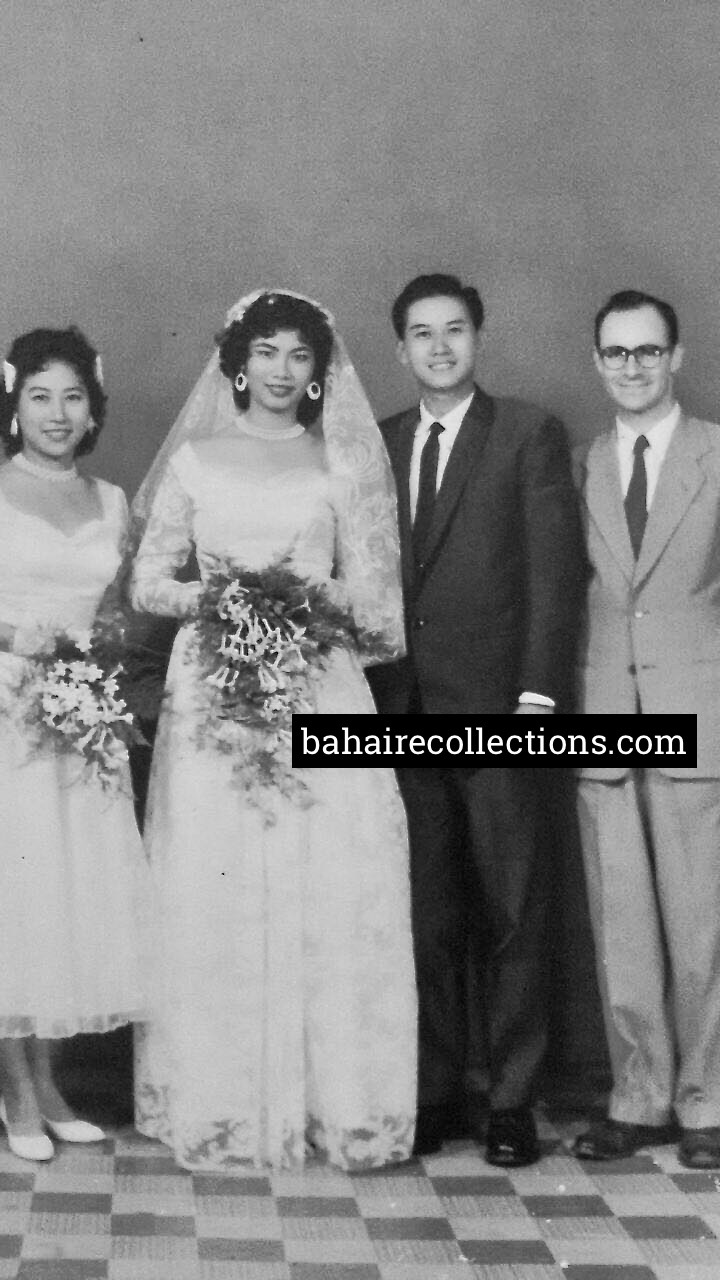
Their wedding with Lily Chinniah (left) as bridesmaid,
and Bill Smits from the USA (right) as bestman
With this sweet beginning, the couple teamed up to serve the Cause resolutely and effectively wherever they resided and became an example of service to many families. They would go on to have two children, Faith Leong was born in 1960 and Shemane Leong was born in 1962.
The timely transfer of Ho Chiew to Malacca in late 1958 was providential as he had an important role to play in the town of Malacca where a serious crisis was fomenting, unfortunately, caused by some ambitious personalities. In 1959 the Bahá’í community of Malacca was vibrant with a great number of activities were carried out unitedly. However, the community began witnessing estrangement among some key believers and in 1960 this developed into a serious crisis that split the community. Ho Chiew was elected to the Local Spiritual Assembly in Ridván 1960, and as a member of the institution, he showed so much fortitude and courage in strikingly and courageously defending both the institutions and the community. God-given courage enabled him to mitigate the effects of the crisis.
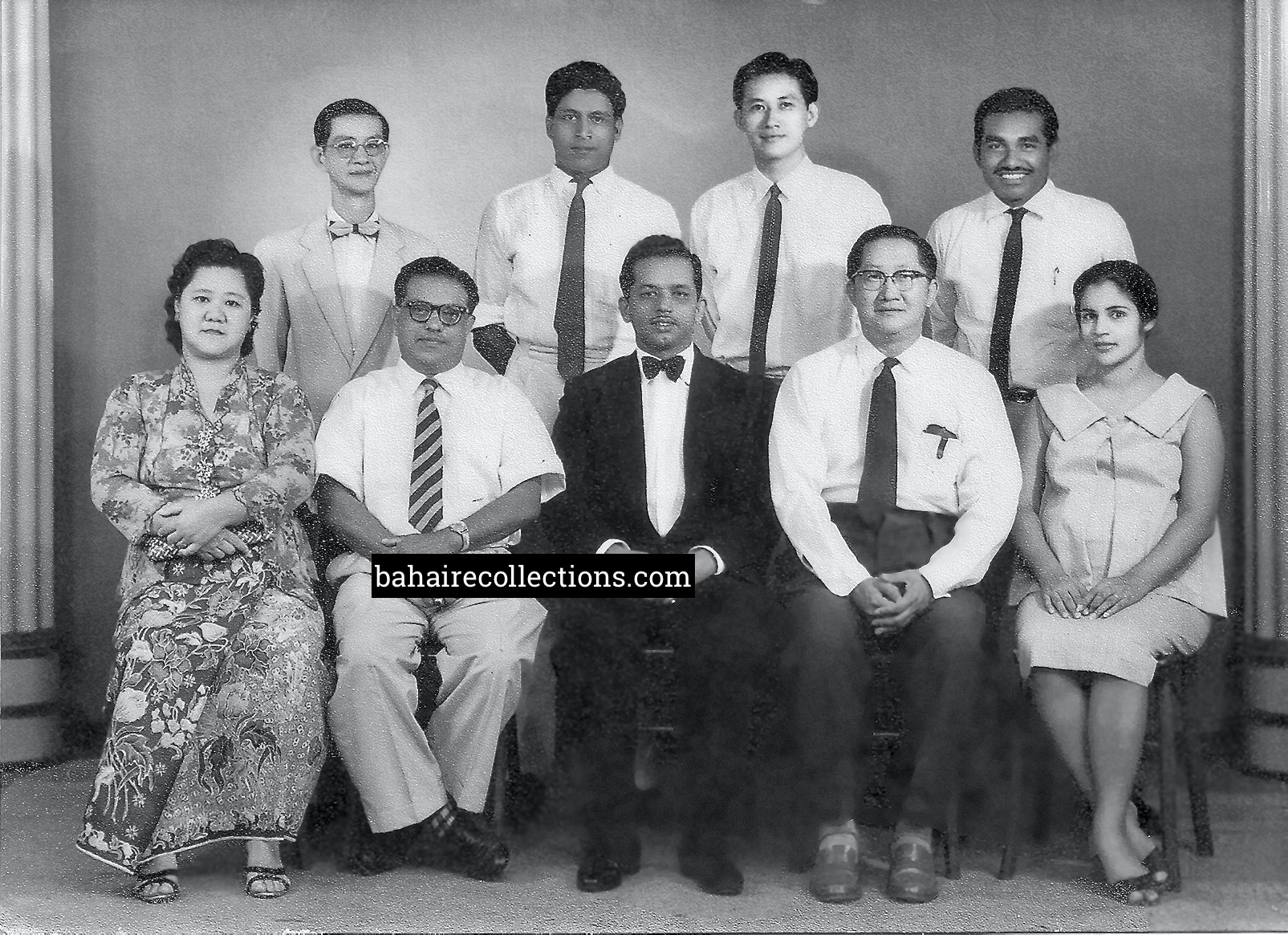
Father and son serving on the Local Spiritual Assembly of Malacca town, 1960. Seated L-R: Lena Saurajen, Saurajen, Tony Fernandez, Leong Tat Chee, and Betty Fernandez. Standing L-R: Chin Soon Boon, Kumara Das, Leong Ho Chiew, and Raymond Peter
Sometime after the election of the Local Spiritual Assembly of Malacca in 1960, Ho Chiew was transferred from Malacca to Kuala Lumpur as a Police Inspector to work in the Police Headquarters in Bluff Road. That was the time when the Petaling Jaya community that would later become one of the premier communities in the country was just budding. Manpower and a meeting place were needed for the growth of the Petaling Jaya community and Ho Chiew and Gina were to play a significant part. Three prominent believers teamed up to form the nucleus of the community. One was Ho Chiew who took up residence at 45, Jalan 47, Petaling Jaya. The other was Maheshwar Dayal, a pioneer from India to Malaya in 1958 who also took up residence in Petaling Jaya. He worked in the Marketing Department of the Lever Brothers and left for Canada in January 1966. In 1962 Dr. Robert J. Wolff, a medical officer from Hawaii, and his wife Elinor came to Petaling Jaya. Dr. Wolff was a nutrition expert from the World Health Organisation who came to study the dietary habits of the aborigine people. He rented a bungalow at 9, Road 5/35, Petaling Jaya. Dr. Wolff and his wife resided in Petaling Jaya until 1964. Of the three houses, the home of the Wolffs became the focal point of activities. Since manpower was still inadequate in Kuala Lumpur in 1961 the members of the Local Spiritual Assembly of Kuala Lumpur in that year was made up of Ho Chiew and Maheshwar Dayal from Petaling Jaya, with Ho Chiew serving as the Secretary. In that sense, Ho Chiew had a role in the early development of the Faith in Kuala Lumpur as well as Petaling Jaya. In October 1962, the Local Spiritual Assembly of Petaling Jaya itself was formed with the assistance of the Bahá’ís of Kuala Lumpur.
When Dr. Wolff left Malaysia in 1964, there was a need for a proper meeting place and the home of Ho Chiew and Gina served the purpose. In 1967 he moved to a new bungalow at 8, Jalan Padang in Petaling Jaya, which then came to be the “defacto” Bahá’í Center for Petaling Jaya. Ho Chiew and Gina’s new home became a sanctuary for the youths and many visiting Bahá’ís. Believers from other parts of the country coming to Kuala Lumpur for work or education were invariably drawn to the home of Ho Chiew in Petaling Jaya, which was becoming a satellite town to Kuala Lumpur. Everyone was made to feel welcome with cold drinks and warm greetings from his family. Each evening close to ten youth would gather for conversation about the Faith and fellowship which would invariably end up with dinner. Ho Chiew would walk into the house after his work looking stylish and smart in his Police Inspector uniform and head for his bedroom. Within moments, he would come out of his room in ‘sarong’ as and join the rest of the friends as one of them. His strict police-image would simply evaporate. It was the warm hospitality of the Leong family, that built up the early community of Petaling Jaya. While the vast majority of the believers were youths, there were very few families and the Leongs were one of those few. There were occasions when a visiting Hand of the Cause of God was picked up from Subang airport and brought for an informal meeting at the Ho Chew’s residence. It was a wonderful treat when visitors, including his father Leong Tat Chee, who would come over and stay the night.
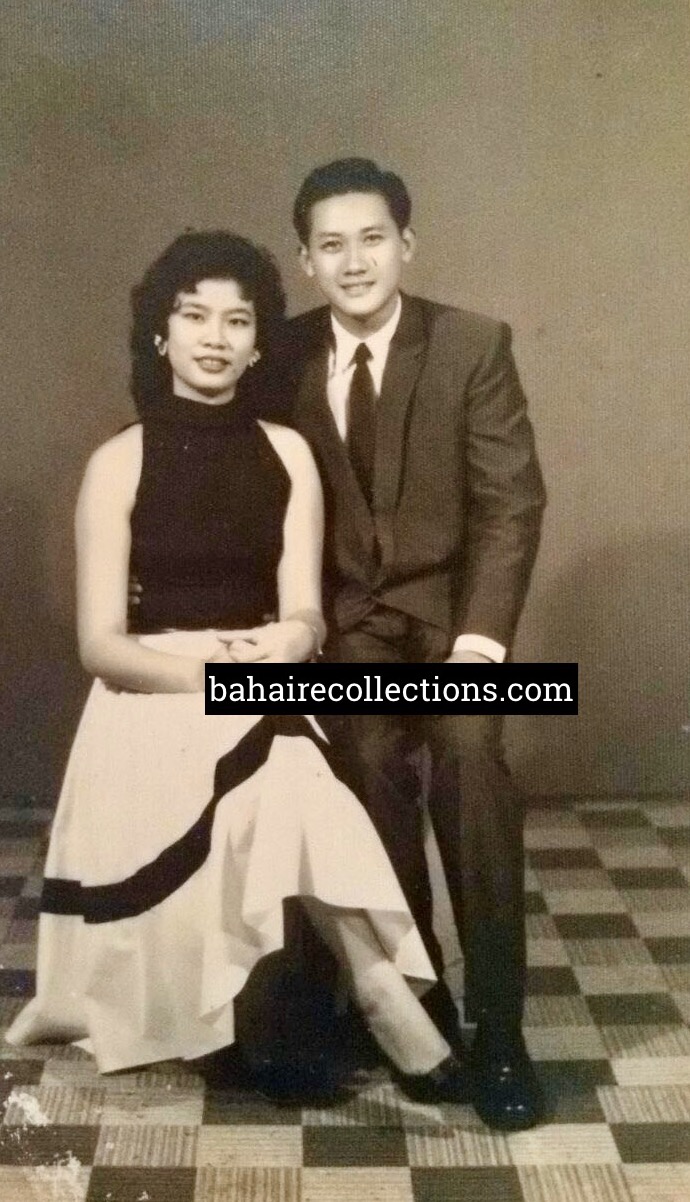
Leongs in Petaling Jaya opened their home and hearts for the Bahá’í community.
In 1969, Yin Hong Shuen and T. Thanabalan rented a room in their house in 1969. When Yin Hong Shuen left the following year, T.K. Lee became the roommate of Thanabalan. These three are among the many other youths who found a true homely spirit and atmosphere at the residence of the Leongs.
The living room became a perfect platform for action and activities. Banners for the first World Peace Day held in September 1970 in Petaling Jaya that was the first of its kind in this part of the world, and for the Oceanic Conference in early 1971 in Singapore were prepared in the living room and the garage of the Leong family. To a large extent, the Leongs had to sacrifice their privacy for the needs of the Faith.
By 1968 the Petaling Jaya community was gaining in strength with more people coming into the Faith. Tony Fernandez was transferred from Bagan Serai to Petaling Jaya as Officer-in-Charge of Police District and his family added further strength. His children Shirin and Zeena joined the children of Ho Chiew – Faith and Shemane in children classes held every Sunday. In 1969, Mr. Lee Tiew Kiang (T. K. Lee) living in Petaling Jaya and working with the Straits Times daily accepted the Faith through Yin Hong Shuen. Another strong addition to the community of the Greatest Name in 1969 was Shirley Wong Mooi Nyuke who was guided into the Faith in a most interesting way. In 1960 the Leong family transferred from Malacca to a house opposite that of Shirley Wong who was then a child of 8 years. She would frequent the house of the Leongs and helped make tea and serve the Bahá’í friends visiting them. She well remembers the year 1963 when she joined Gina in making tea for a large group of friends who had gathered in the house of the Leongs before making their trip to Singapore to catch a plane to fly to London to attend the First Bahá’í World Congress. Gina brought Shirley into the Faith.
With these developments, the Local Spiritual Assembly and the community of Petaling Jaya were soon well established, with Ho Chiew as Chairman for many years. He stressed punctuality and meetings always started on time. All members of the Local Spiritual Assembly were pillars of strength and rose to serve with distinction in the manifold arenas of the Cause. The old believers recall Ho Chiew as a no-nonsense person where Faith was concerned and a very effective Chairman. As for the youths, Ho Chiew was a role model, and together with his dear wife Gina, they left a deep culture of servitude to the Holy Threshold which these youths emulated in their later years.
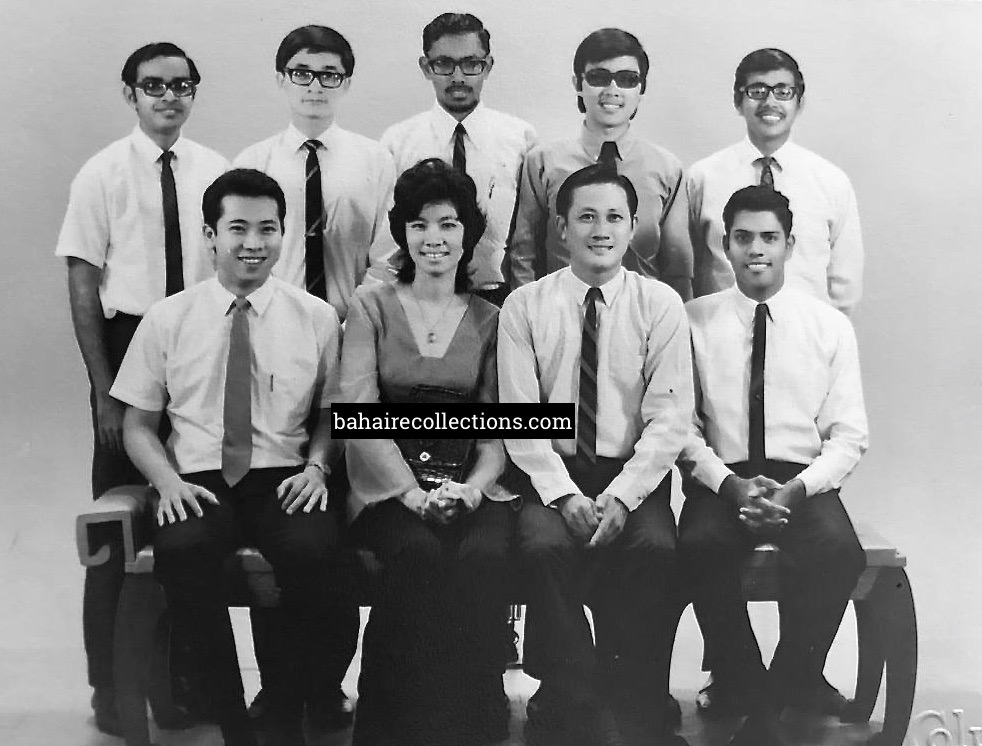
Husband and wife on the Local Spiritual Assembly of Petaling Jaya, 1971. Seated L-R: James Liew, Gina, Leong Ho Chiew, and Thanabalan. Standing L-R: V. Theenathayalu, Ying Hong Shuen, M. Singaraveloo, T.K. Lee, and N. S. S. Silan. The Leongs were the only married members of this Assembly.
Ho Chiew was moved with his family to Tapah at the end of 1972 to take his promotion as Assistant Superintendent of Police, a high-ranking position in the Police Force effective January 1973. The Local Spiritual Assembly of Petaling Jaya, in bidding him a sad farewell, acknowledged his regular contribution to the Bahá’í Funds and his relentless efforts in galvanizing the community. His family had played a significant role Petaling Jaya and they were destined to play another important role in Tapah. In Tapah he was also a Special Branch officer who had to risk his life in the course of fighting against the communist insurgents. His father Leong Tat Chee, at that time ailing with cancer, was very worried and urged his family members to pray hard for Ho Chiew’s protection.
Ho Chiew remained in Tapah for some five years. Tapah was the closest town to the jungles of Perak where the Asli people (aborigines) lived in large numbers. Thus it was in Tapah that Ho Chiew had a new role to play in the Cause- providing comfort, consolation, and strength to the Asli believers. The Asli believers started to come to his spacious government bungalow house from the interiors of Perak and Pahang states and would pass several nights. Mr. Rama Naidu, another active teacher of the Asli people residing in the neighboring Bidor town would come over to the house of Ho Chiew and conduct training institutes for them. Ho Chiew and his wife would happily welcome and cook and serve these Asli friends. A few days in advance of these gatherings, Ho Chiew would chop woods for cooking while Gina was a mother figure and provided the best hospitality and treated them with all kindness.
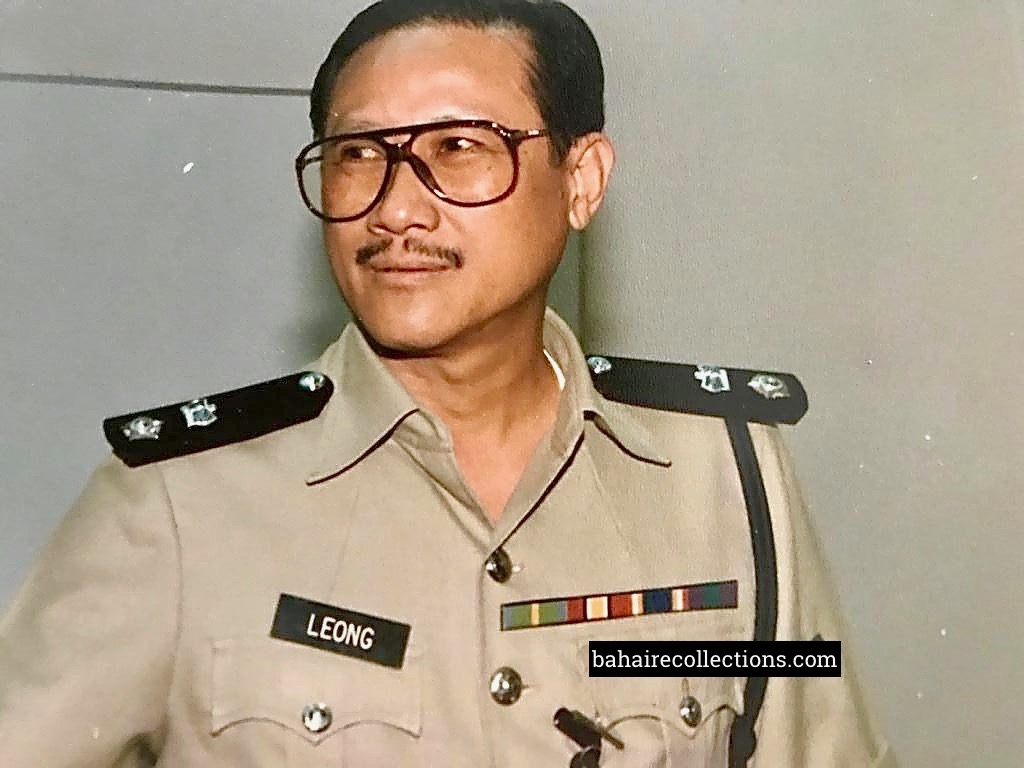
Strict in looks, yet tender in the heart.
Ho Chiew had a heart larger than life. Living in the jungles, the Asli friends were not accustomed to life in urban settings, especially toilet habits. Ho Chiew, out of his love for them added toilets and other facilities for them, along with an extension of kitchen for cooking facilities. The Asli friends would not know how to use the toilets, and after they had left, Ho Chiew would patiently clean the toilets himself. When they were leaving back into the jungles, Ho Chiew would quietly slip some money into their pockets in case they needed to buy anything in Tapah town. The Asli friends by and large were not accustomed to such sincere love and affection from the wider world. They saw the teachings translated into action in the persons of Ho Chiew and Gina. The couple was completely freed from prejudice in their dealings with those simple people who had not yet been polluted by the urban lifestyle.
The couple loved and admired the Asli believers for their sincerity, honesty, discipline, and their sacrificial contributions to the Bahá’í funds. Walking for days from the jungles they would carry along their home-made bamboo savings tubes, and upon arriving at their residence in Tapah would hand over the funds to be passed on to the National Treasurer in Kuala Lumpur. The bamboo saving tubes would be full of coins, which, when added up would not be much by urban standards. Suffice to say the Asli friends would have sacrificed their wages of many days to make these contributions.
The Asli friends, when coming to Tapah town for any reason would be very excited to visit the home of Ho Chiew. But in 1976 visits by urban people into the jungles were prohibited on account of government security control. This prevented Bahá’ís too from freely going into the jungles of Perak. For the Asli friends who were able to come out of the jungles, they came to the house of Ho Chiew for meetings. Likewise, meetings for them were also held in Cameron Highlands in the neighbouring state of Pahang. The 24-hour curfew imposed in 1976 was a blessing, as the responsibility to take the Faith to the Asli people fell on the shoulders of the Asli believers themselves. With their own teaching initiatives, they brought in large groups of the Temiar people from the state of Kelantan. But a new challenge emerged. Within the Temiar tribe, a rumor was spread that the Bahá’í Faith was sympathetic to the communist cause, and so they kept away from the Faith for some time. But when they saw Ho Chiew, such a high-ranking officer was a Bahá’í they realized that the rumour was unfounded, and this change of mind was a turning point for Asli people from the Temiar tribe returning once again to the Bahá’í fold.
Ho Chiew was a great defender of the Cause, and the nation as well. He defended the country aggressively from the outlawed communist insurgents so successfully that they dreaded Ho Chiew as their real threat. They naturally employed dirty means to match his might and strength. Thus due to his success in suppressing communist activities around Tapah, it was in 1975 that Ho Chiew’s life came under constant threat and he too went through great distress, even for a man known for his extraordinary courage. Working as a Special Branch Officer he was involved in very sensitive and dangerous assignments. The checked insurgents threatened to end his life. His supervisor urged him to change his appearance by growing beard and mustache. He found it difficult to sleep and the little sleep ever was with his official gun next to him for personal protection. At the height of this stress that Ho Chiew wrote a confidential letter to Shirley Wong, by then a trusted friend who was much loved by his wife and two children, leaving instructions in case the unexpected happened. The typewritten letter from the Police Head Office in Tapah dated 11 June 1975 reads,
Dear Shirley,
Recently I have been thinking seriously about the latest killings of our special branch officers by the underground communists. In all, there were now ten killings. This is just the beginning and there will be more to come. We hope not. In our daily duties and life, anything can happen to oneself (pray to God that it doesn’t). This is an occupational hazard and we leave it to Bahá’u’lláh to guide and protect us for He knows what is best for us. However, I have to plan ahead and prepare now if anything should happen to myself during the course of my daily life and duties. Hence I am writing this letter to you requesting you to be a spiritual and physical sister of my children should my life be in danger. I know my children always think of you as an elder sister but more so a spiritual one. I hope I am not asking too much, but I only know you are close to the children. If anything should happen to me, Gina and the children will be taken care of moderately. They will be able to live comfortably, but not luxuriously. This is all I request from you and please keep this letter in confidence and file it for future reference. A copy of this letter is filed in my personal file. Allah-u-Abha and our love to you always.
(Signed)
Leong Ho Chiew
When Shirley received the letter from Ho Chiew, she was totally shocked, shaken up and for a moment lost in thoughts. After recital of some prayers she summoned all her strength and telephoned Ho Chiew in Tapah. She informed him that she was too young and still single to handle such a heavy responsibility. Ho Chiew replied that when the time comes she would rise to the occasion, armed with the guidance from Bahá’u’lláh. She kept the letter in her drawer and prayed ardently for the protection of Ho Chiew and his family. (This letter is now made available to the public for the first time- through this blog). Family members and friends who knew his situation prayed for the protection of his family. Enveloped by constant prayers by family and friends he weathered the emotional cyclone and withstood all sufferings with unflinching strength. Finally, with the mercy of Bahá’u’lláh, his life was spared. It became clear that the fate and life of Ho Chiew was in the hands of Bahá’u’lláh and not in the hands of his enemies. All family friends, including Shirley rendered thanks unto God. That was not the end of his ordeal. If threat to his life was not enough, some mischief makers resorted to a cowardly act of sending petitions of all kinds about him to the Police Headquarters. His involvement in consorting with the Asli people was misrepresented to the Police Headquarters. When Ho Chiew was summoned for explanation, he turned that inquiry session into a beautiful fireside. Those in authority were satisfied and Ho Chiew returned with results- having earned admiration for the Faith at the top levels in the Police Force. But his family was not to remain in Tapah for long.
After Tapah, he was sent to Kampar town in 1979 as the Officer in Charge of Police District (OCPD) of the Kampar District. Here too he was actively serving the Faith by organizing Bahá’í activities, especially many firesides. He introduced a new culture at his workplace. He allowed members of the public to walk into his room with no prior appointment. This was precedence not to be continued by his successors after his transfer out of Kampar town.
When Ho Chiew was in Kampar, he was told that his next posting would be coming soon and was informed that he would be posted to Kota Baru town in Kelantan state. However, when the letter of transfer arrived, it said that they were transferring him to Ipoh. Ho Chiew was puzzled at this unexpected turn of events as he saw Ipoh as comparatively a sleepy town and not suited to a police officer of his seniority and experience. However, unbeknown to Ho Chiew, it seems Bahá’u’lláh had His own plan for him. It was to do with Yankee Leong, whom the Universal House of Justice referred to as the first enlightened soul to accept the Faith withing the country. Yankee Leong was by then in his 80s, retired, and living in the residence of his daughter Theresa Chee in Ipoh. Thus, Ho Chiew arrived in Ipoh in 1985 as Assistant Superintendent of Police, a very high-ranking position. While in Ipoh, Yankee Leong was failing in his health. One day Ho Chiew had a dream which he related to his wife, and later to Soheil, son of his sister Lily Chinniah and a few others. In his dream, his father Leong Tat Chee appeared with a smile and stated that in 3 days, Yankee Leong would pass away. Leong Tat Chee told Ho Chiew to make photocopies of Yankee Leong’s his identity card and arrange for outriders for his cortege and he was not to disclose it to anyone. The saddened Ho Chiew visited Yankee Leong every day after his work till he passed away – exactly three days later on 17 June 1986. As soon as Yankee Leong passed away, filled with boundless love and admiration this saintly soul, Ho Chiew stepped in and swung into action, with the concurrence of the family of Yankee Leong.
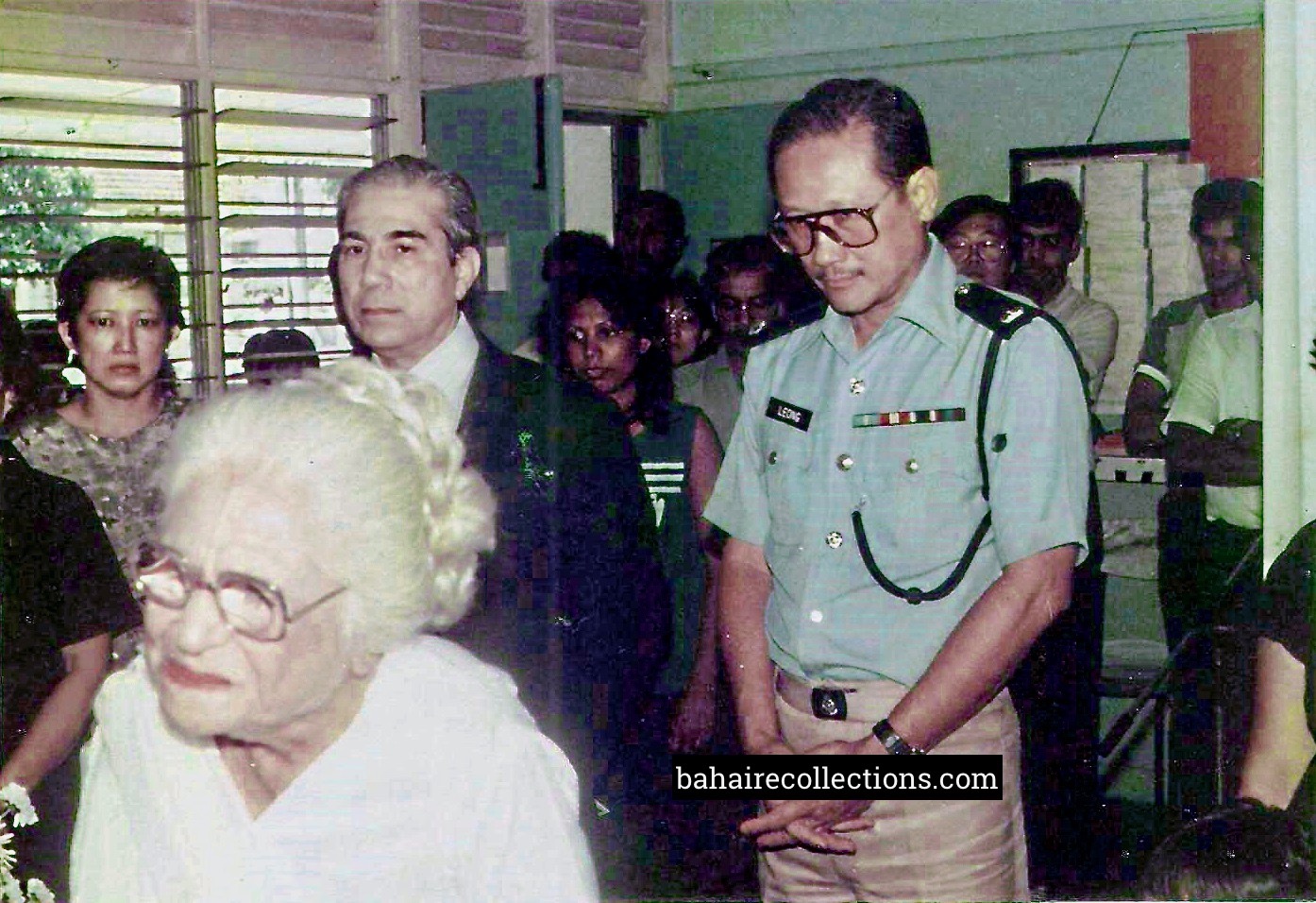
At the funeral of Yankee Leong. Mrs. Shirin Fozdar at left, with Dr. John Fozdar at the back. Leong Ho Chiew at right, taking full charge of the funeral arrangements
He assisted the family in the funeral arrangements. He photocopied the identity card of Yankee Leong and made suitable arrangements for police outriders for the day of his funeral and to control traffic for the procession, knowing fully well that there would be a large turnout of friends for the funeral and the procession. There was already a Police Corporal in charge in the Canning Road where Yankee Leong lived, to look into the traffic control and security all the way through to the Chinese cemetery in Tambun Road, as the Ipoh Bahá’í community did not have its own burial ground. But Ho Chiew as a high-ranking Assistant Superintendent of Police took control of regulating the traffic in full police uniform, both on official duty and as a dutiful believer. His own role added to the majesty with which Yankee Leong was sent off to the Chinese burial ground in Tambun Road. While James Liew ably chaired the funeral service, Ho Chiew looked into the logistics, security during the procession and crowd-control with the assistance of a megaphone. He went into the details of briefing the pallbearers on how the coffin has to be carried on to the hearse, without losing the balance, and in great dignity. The sight of the funeral cortege, led by police outriders and over 500 mourners of various races following the hearse, was truly suited to such a solemn and yet glorious occasion. Onlookers were wondering who was this great Chinese man, for whom hundreds of people with mixed races from various parts of Malaysia and abroad turned up and walked in the procession. That was a rare sight unprecedented. It seems that Bahá’u’lláh desired to give one of His favoured servant Yankee Leong a kingly send-off on account of his great services he rendered to the Cause in Malaysia and abroad. At the burial site, it was Ho Chiew who said the congregational prayer for the departed. When the remains of Yankee Leong were finally buried and Ho Chiew had discharged all duties and responsibilities in full, he gave his final salute, and retreated in utter respect and love. Ho Chiew was about the last to return after ensuring everything was complete and in order. With such a meticulous role that Ho Chiew played, the passing of Yankee Leong shall always be associated with Ho Chiew.
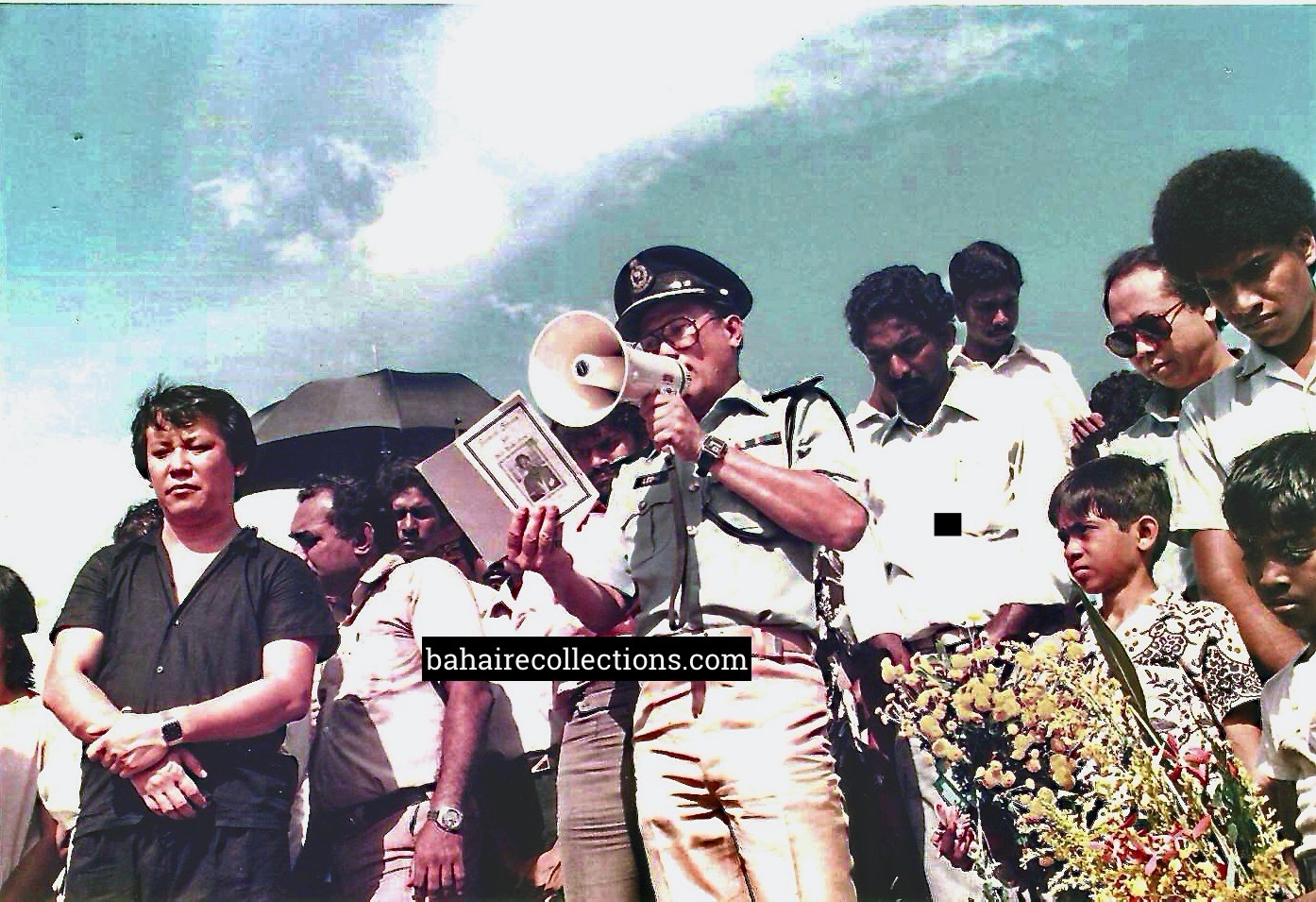
Leong Ho Chiew reciting the congregational prayer for the departed, with Raymond Peter and Francis Ng (in black attire) to his right, and James Liew (in dark glasses) to his left
On 19 June, Yankee Leong, the Universal House of Justice sent this moving message of condolence:
EXPRESS HEARTFELT SYMPATHY WITH BELOVED FRIENDS MALAYSIA PASSING YANKEE LEONG WHO WILL EVER BE REMEMBERED AS FIRST ENLIGHTENED SOUL TO ACCEPT FAITH WITHIN COUNTRY. AS DEDICATED SERVANT BLESSED BEAUTY HE PROMOTED LIFE GIVING MESSAGE BAHA’U’LLAH, ESTABLISHED HIS SHELTERING INSTITUTIONS, INSPIRED HIS LOVING FOLLOWERS AND SET EXAMPLE FOR THE FRIENDS BELONGING TO THE GREAT CHINESE RACE BY RAISING FOUNDATION DIVINE CIVILIZATION ON EARTH. HIS UNTIRING MANIFOLD SERVICES IN SOUTH EAST ASIA UNFORGETTABLE. ADVISE HOLD BEFITTING MEMORIAL GATHERINGS IN MALAYSIA AND SINGAPORE. ASSURE DISTINGUISHED RELATIVES, FRIENDS LOVING PRAYERS PROGRESS SOUL ABHA KINGDOM.
Another equally significant role that Ho Chiew played was the distribution of the Peace Statement to those eminently placed in society. In 1986, the Universal House of Justice had issued the statement on the Promise of World Peace to be delivered to those in top brackets in society. With the loving guidance of the National Spiritual Assembly of Malaysia, the believers holding high positions to create inroads into the top echelons for the distribution of the Peace Statement. In the town of Ipoh, it was Ho Chiew who was the natural choice to join in this noble task, in his capacity as Assistant Superintendent of Police. With his assistance, the Peace Statement was given in great dignity to several of those in authority.
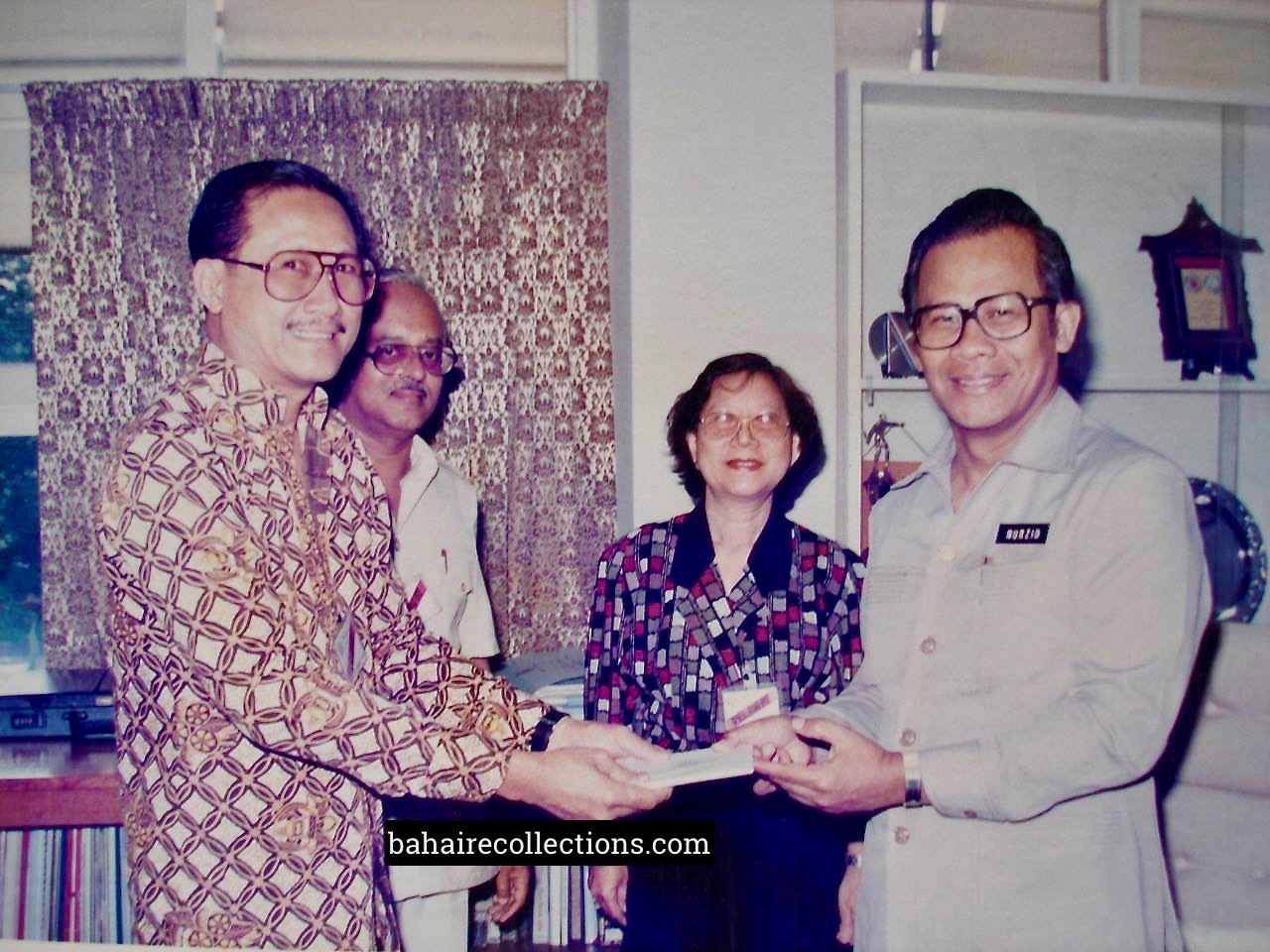
Leong Ho Chiew presenting the Peace Statement to the State Secretary of Perak, with K. Krishnan and Mrs. Theresa Chee at the back
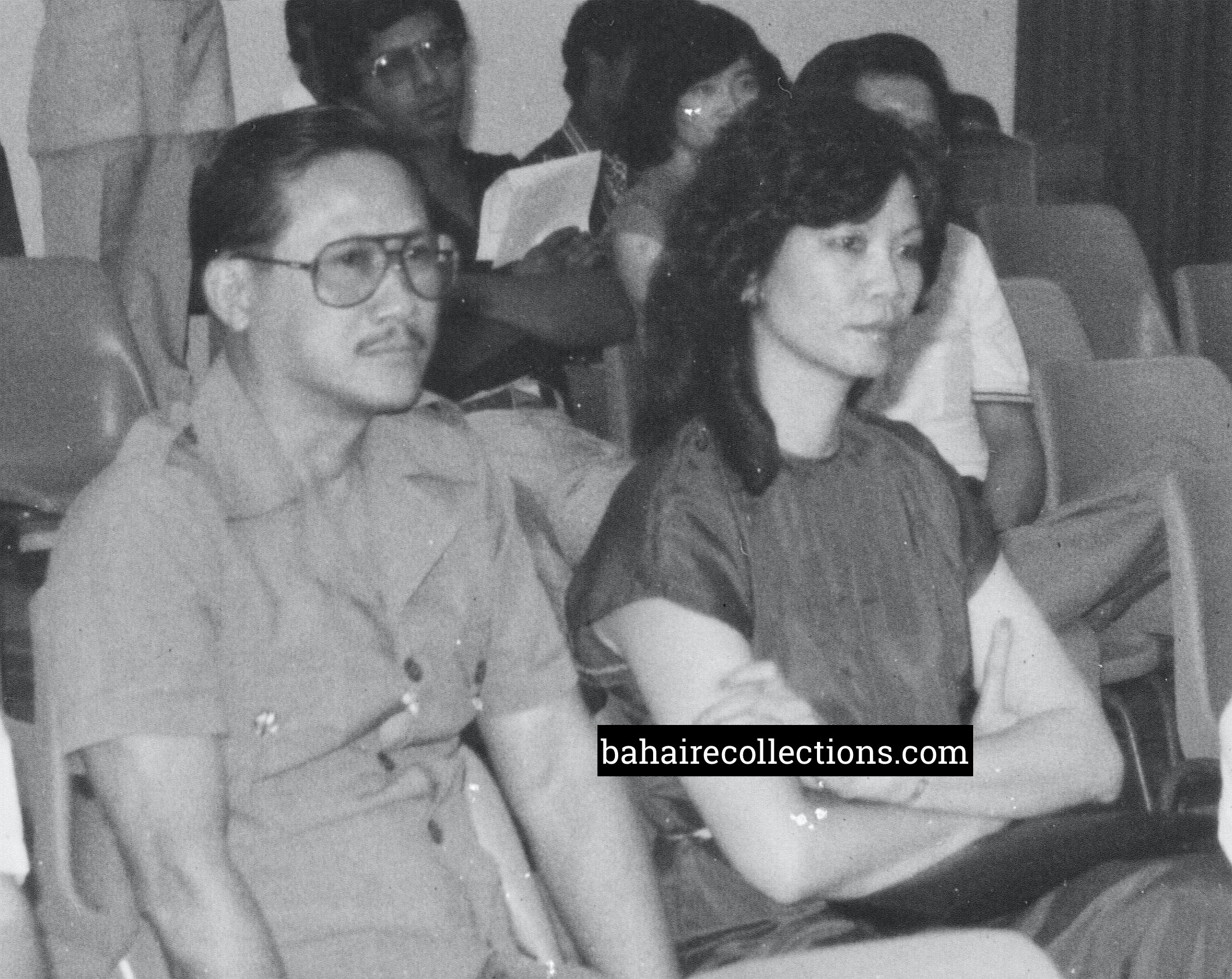
The Leongs at a community gathering in Ipoh
From Ipoh, Ho Chiew was posted to Georgetown, Penang island in 1989 as full Superintendent of Police of Penang and as head of Special Branch in Penang. In Penang took up residence in Tanjung Bungah. It was that he and his wife were able to speak about the Faith to Miss Yap Siok Hoon who was renting a house opposite his who sometime later, accepted the Faith followed by Mr. Chua Hun Kee whom she married. The couple has become the pillars of the Faith in Penang since.
Next, Ho Chiew focused his energy and attention on another important group of believers — those in the fishing villages. When he visited the Kuala Sungei Pinang fishing village for Bahá’í meetings, he would sweep the floor. The surprised villagers tried to stop such a high-ranking officer from doing what they considered was work meant for the manual workers. In his usual frankness, he replied, “Shut up! When I am in uniform I may be an officer. Now, I am off duty and we are all one family member serving Bahá’u’lláh.” It was through such gestures that Ho Chiew was able to win over many simple souls to be confirmed into the Faith.
Ho Chiew retired in 1991 in Penang and the family returned to Petaling Jaya. By this time his two daughters Faith Leong and Shermane Leong had already been well trained to join their parents in organizing activities. Petaling Jaya community too had grown big and was able to have its own Bahá’í Center. Yet the house of Ho Chiew continued to be another meeting point. Together with their two daughters, Ho Chiew and Gina hosted all the Bahá’ís and the wider community who dropped in at any time, and they all made everyone feel comfortable in a very loving manner. During the fasting period, youths were invited to the breaking of the sat at their home, reminiscent of his own father Leong Tat Chee who carried out the same service to the Malacca town community.
Ho Chiew continued to serve the Cause in many ways both within Malaysia and overseas. In 1993, he undertook one trip to Cambodia for a month and in the following year, he organized a group trip to the country for a month. The second trip in 1994 was undertaken with his sister Lily Chinniah and her future daughter-in-law Bernice. He had also organized a group trip to Hong Kong and one to the refugee camp in Thailand, apart from several teaching trips to Hat Yai.
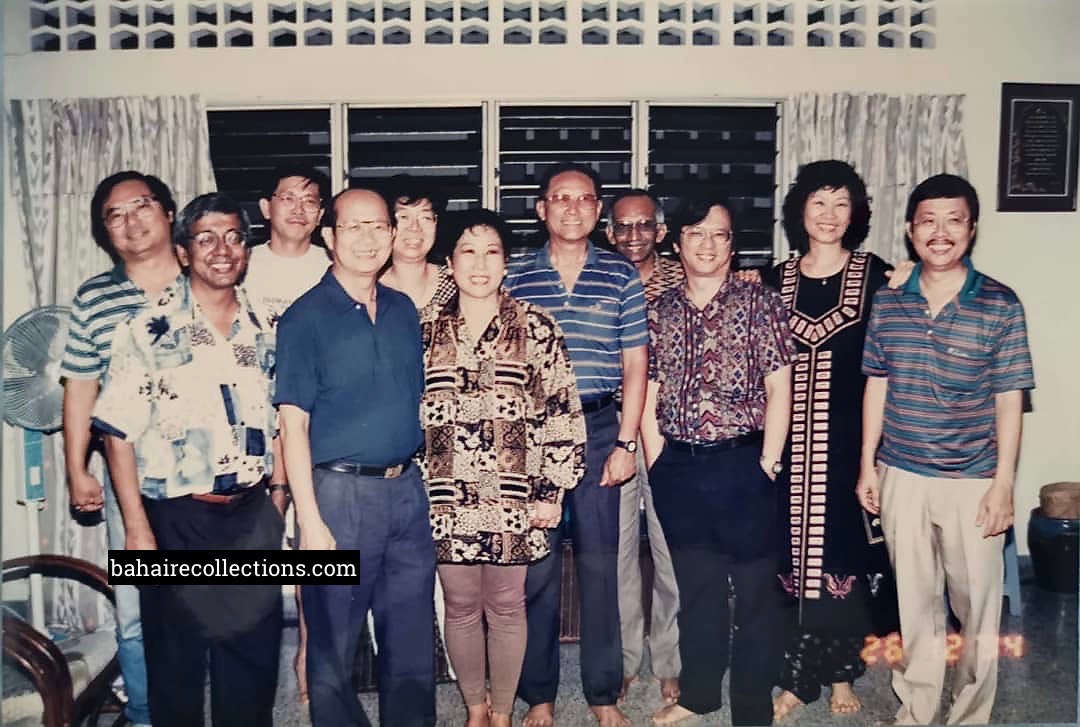
A gathering to celebrate the birthday of Leong Ho Chiew in 1994, and to rekindle the nostalgic spirit. L-R: Lum Weng Hup, N.S. S. Silan William Chin, Errol Seow, Shirley Wong, Lily Chinniah, Leong Ho Chiew, S. Ravichandran, Lum Weng Chew, Gina, and T. K. Lee
In early 1997, Ho Chiew was suffering from stomach pain and visited many doctors who could not diagnose the cause. Finally, he was diagnosed with pancreatic cancer. Just like his father, he too took the illness as the will of God. He suffered unbearable pain but resigned himself to the will of God. What surprised many Bahá’ís who visited him was the courage and dominant spirit with which he fought against cancer. Knowing that his fate on this earthly life has been sealed, he quickly prepared a will. His younger brother Leong Ho San was pioneering with his wife in Papua New Guinea and yet found a way of visiting him one month before his passing and found him very frail, yet in good spirits and resigned himself to the will of God. His sisters residing in Malaysia- Nelly Leong Wai Yeng, Annie Leong Wai Heong, Mary Dharmalingam, Lily Chinniah, and his youngest brother Leong Ho Min visited him often, bringing along their children.
Towards the last few days when his condition worsened, many Bahá’ís visited him daily in the evenings who prayed for his recovery. His close friend T. K. Lee was among those. Ho Chiew would be in his sarong and would appear relaxed, though was weakening by the day. He would do most of the talking, while the friends would be listeners. In the last week of his earthly life, knowing that his call to the realms above was imminent, he told the Bahá’ís not to pray for his recovery anymore but for his early departure. He told them his healing was already out of question! Even in the most painful moment, he passed a statement in jest that he would have gone earlier had it not been the prayers of the believers.
Two days before his passing, he called his wife whom he loved very much, and informed her that he dreamt of his parents bringing him his passport for an unknown journey. Gina caught the signal and alerted the Local Spiritual Assembly of Petaling Jaya. All the members immediately communicated with each other and rushed to see him. When they entered his room Ho Chiew who was on his bed tried to force himself to stand as a mark of respect to them who were representing a divinely ordained institution. Moved by the respect he had for the institution the members insisted that he remained on the bed. They said a round of prayers for him after which, Ho Chiew held the hand of his wife and said I am singing this song for you and sang the famous “Dondang Sayang” – love ballad influenced by traditional Portuguese folk music that was popular in Malacca in those days where both Ho Chiew and Gina came from. Other Local Assembly members who knew the song joined him in singing the song, with tears welling in their eyes. He then requested them in what was his final wish, not to buy wreaths or flowers or have a grand funeral for him. All he had wanted was a simple send-off with a simple burial ceremony.
His two daughters Faith Leong and Shemane sat at the feet of their father one day before his passing, knowing fully well that the end of his earthly life was imminent. Faith told him, “Pa, you must always continue to guide us, no matter what.” When she said this, Ho Chiew knew that his children were ready for him to depart from this world and had accepted the fact that he was going to leave them soon for the realms above. Ho Chiew smiled and acknowledged that he would assist the family. It is clear the family was well aware of this statement from Abdul Baha, “As to the question that the holy and spiritual souls influence, help and guide the creatures after they have cast off this elemental mould–this is an established truth of the Bahá’ís.”
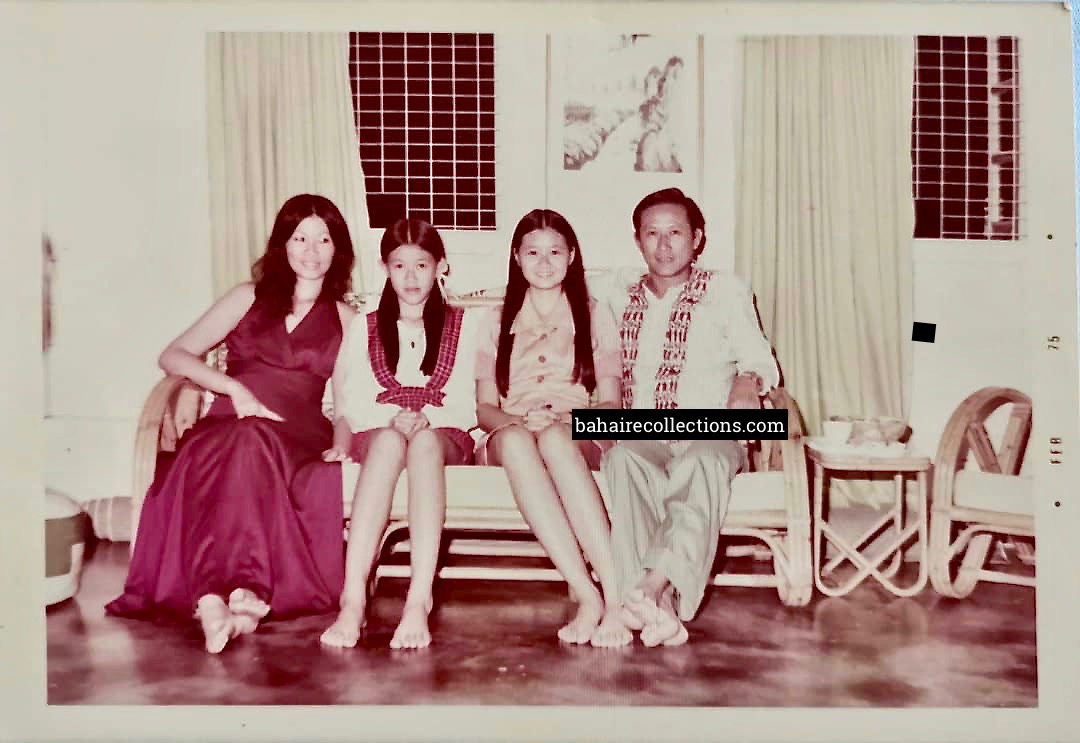
A happy family during happier times. L-R: Gina, Shemane, Faith and Leong Ho Chiew
He passed away on Monday, 21 July 1997, his two daughters took the lead in making the arrangements for his sendoff. The outpouring of love for him from the Bahá’ís was so great that a huge heap of flowers covered his coffin, though Ho Chiew requested not to, he could not stop the outpouring of love from the friends. T. K. Lee chaired the very well-organized funeral service in the later part of the morning with the arrival of a throng of believers and friends. A long and moving letter from his younger brother Leong Ho San from Australia who could not make it to the funeral was read, which brought tears to many. And Ho Chiew was given a befitting sendoff to be buried in the Xiao En Memorial Park to the south of Kuala Lumpur, close to Nilai town. Thus, the fascinating life of Leong Ho Chiew filled with great heroism came to a triumphal close.
After the passing of Ho Chiew, the greatness of the man was on the lips of many who had known him. He was one of those who started regular contributions to the Bahá’í Funds in the very early days. At one of the conferences, Ho Chiew was called by the national institution, which was pretty aware of his regular contributions to say a few words about his contributing habits. He came up to the stage and said as follows, “When I get my salary the first thing I do is contribute to the Fund, whatever my financial commitment is. This is the most important. The rest is secondary.” He always organized his financial matters very well. All his salary would go to the family and the Bahá’í Funds. As for his rainy days, he saved from his mileage claims.
During his period in the police force, he was seen as a very honest, upright, and a hardworking police officer. There was no single disciplinary case against him. In all the places he worked there were attempts by influential people to bribe him, but Ho Chiew absolutely refused them. When he went to the markets, the shopkeepers would not want to take money from him, but Ho Chiew would put the money into their hands or pockets. It did not take long before they came to realize that Ho Chiew’s refusal to accept bribes stemmed from his belief in the Bahá’í teachings, an act that became a teacher of the Faith.
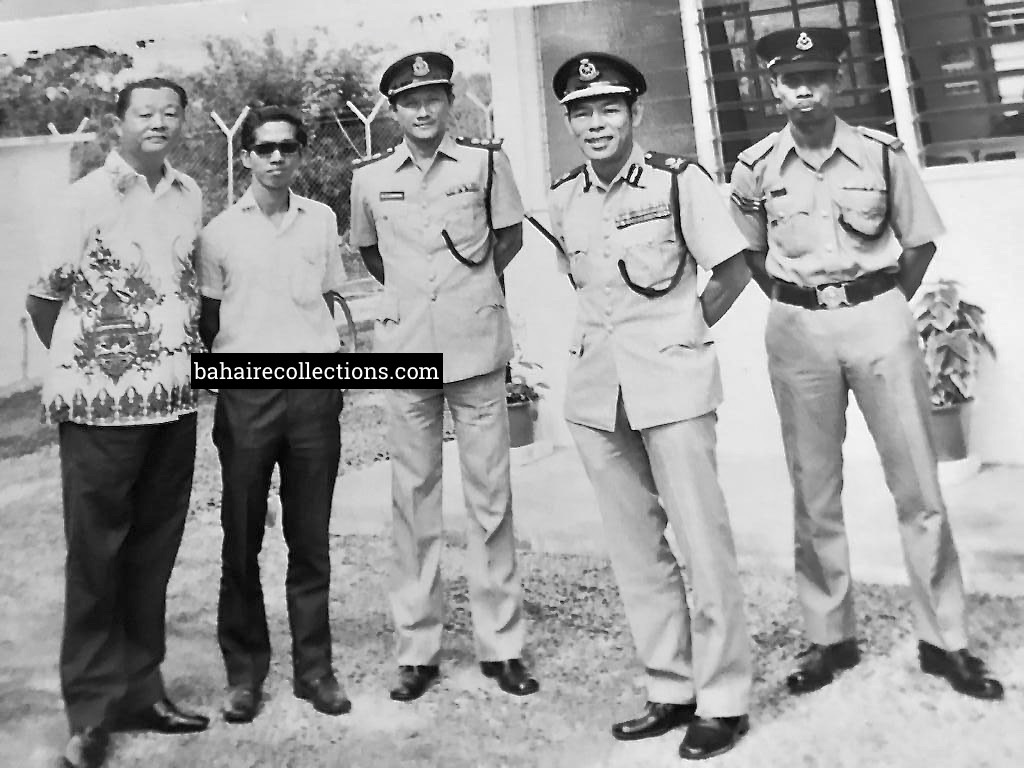
A clean, efficient, and trustworthy Police Officer who made the Police Force proud, and added luster to the community of the Greatest Name
He was also a man of the masses, especially the downtrodden. Ho Chiew organized himself in providing social services for the illiterate. He would fill up forms and documents for the illiterate or type out petition letters to those in authority on several matters and follow up on them. Wherever Ho Chiew stayed he was deeply involved in Bahá’í activities and gave all the encouragement and protection wherever needed. With his high position in the Police Force, he was able to cultivate an excellent external relationship, thus bringing the Cause to those in the higher echelons in society. He retired as one of the highest-ranking and clean Bahá’í in the Police Force, adding further luster to the Faith. But he went on optional retirment one year before his compulsory retirement, when indications were there that he was lined up for even a higher post of Deputy Superintendent of Police. But at the death bed he had remarked that he felt happy to had retired one year earlier to give one more your of his service for the Cause.
Wherever Ho Chiew resided his priority was serving the Cause, a culture imbued from his father, Leong Tat Chee. Outwardly Ho Chiew was known as a no-nonsense and a straightforward person, with piercing eyes that could easily keep people away. But deep inside he was one of the warmest persons one could find. Several people thought him to be unfriendly and reserved. His wife Gina says Ho Chiew could be hot-tempered at times and yet, surprisingly he could also be very patient as well. His father Leong Tat Chee whom he respected and loved had a strong influence in toning him down. Leong Tat Chee had the habit of writing letters to friends across the country, giving guidance from the writings, and adding his own advice. In the early days of Ho Chiew staying in Petaling Jaya, Leong Tat Chee wrote a letter to Ho Chiew, stressing on the importance of suppressing anger. Having read that letter, Ho Chiew tone down very much. Yet his impatience surfaced when believers delayed in executing Bahá’í assignments.
As the eldest son in the family, in true Chinese fashion, he took his responsibilities in safeguarding their welfare very seriously. In the workplace, he was a strict disciplinarian and in the Bahá’í community one who would not tolerate believers going off the tangent. He was vocal and yet obedient to the covenant and the institutions. He was not judgmental, but his intense training as a Special Branch officer within the police force had provided him the gift of intuition in detecting the mischief-makers within the community, and he never hesitated to reprimand them when situations warranted. He knew that left to their ways they would become a perfect recipe for wholesale disasters in the community. He inflexibly loathed individuals abusing their positions or powers vested in them. It was Ho Chiew who would be called upon to ensure order and discipline whenever large-scale gatherings were held. At one Summer School in the mid-1960s, he along with his friend Anthony Louis of Malacca were called upon to look after discipline. At lunchtime, the believers lined up and produced their coupons to be allowed into the dining hall, with Ho Chiew and Anthony Louis manning the entrance. One member of the National Spiritual Assembly arrived without his coupon. But Ho Chiew did not allow him into the lunchroom with a simple explanation, “You are on the National Spiritual Assembly which set this rule, and I have been tasked to carry out this duty.” He was certainly a stickler for the rules! The member of the national institution agreed with him and turned to go back to his room to get his coupon when Ho Chiew told him to please go in to get his lunch. While Ho Chiew was firm in ensuring all followed the rules, he was also practical and applied the rules sensibly.
When the large-scale Oceanic Conference of the South China Seas was held in Singapore in January 1971, with the presence of two Hands of the Cause of God- Mr. Enoch Olinga and Mr. Collis Featherstone, the National Spiritual Assembly of Malaysia appointed Ho Chiew to be in charge of security matters. The community needed such tough taskmasters to ensure discipline and security at important functions, and here was Ho Chiew a ready-made material. Ho Chiew was not an avid reader as he had no time, sleeping very few hours on account of the nature of his job. But he always had the Gleanings from the Writings of Bahá’u’lláh which he read regularly.
The one quality that was second nature in him was his genuine feelings for the needy and the downtrodden. He was a pillar of strength to whoever was in difficulty. As he learned of people in distress, he would pay them visits, with hands full of food. And quietly and unknown to others he would slip into their pockets some cash, without counting the amount. Ho Chiew had risen very high in his career and in society and became a classic case of one who balanced his life well between his services to the Cause, profession, community, and family.
The Bahá’í community would remember him as one who was a courageous defender of the Cause, serving tirelessly till the end of his life and leaving his mark wherever he resided and served. The community would equally remember his wife Gina who had played a significant role in her own effective ways. Some 45 years later, some of the members of the old Local Spiritual Assembly of Petaling Jaya and friends organized a reunion dinner to call to remembrance the services and contribution of the Leongs, with Gina as their guest of honor. That was a gathering of joy and sorrow embracing each other as the ever joyful presence of Leong Ho Chiew was sadly missed! Ho Chiew’s legacy lives in the minds of those with whom he had associated, and shall continue to live forever in history!
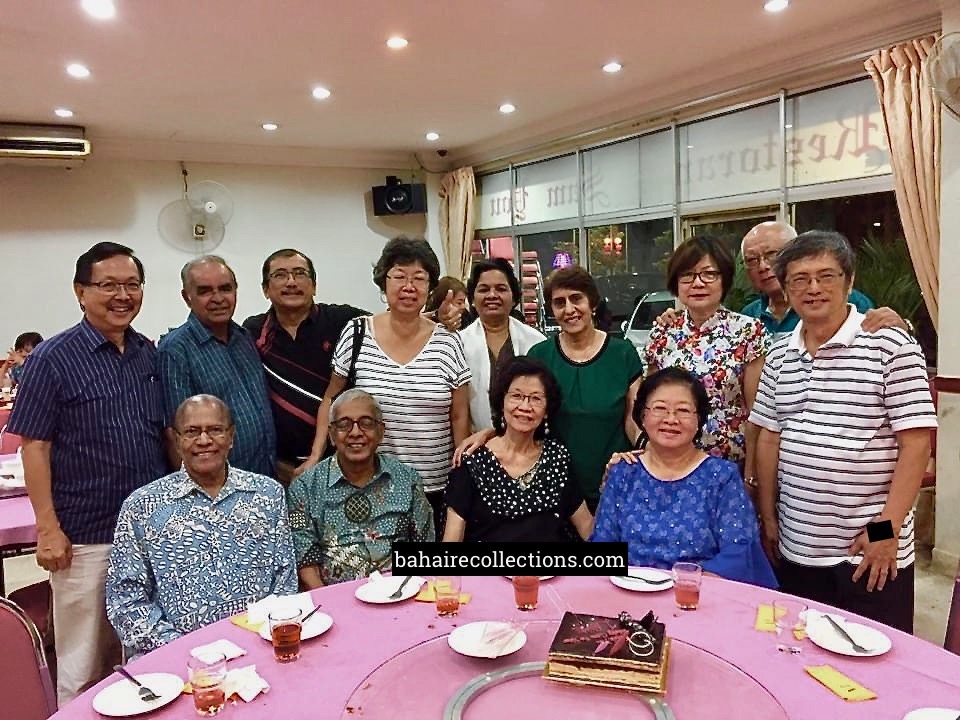
A moment of reflection and reminiscence – after 45 years. A gathering with old friends at a retaurant in Petaling Jaya to honor Gina. Seated L-R: Thanabalan, N. S. S. Silan (from Australia) Gina, Maureen Thanabalan. Standing L-R: T. K. Lee, Theenathayalu, Lum Weng Hoe, Shirly Wong, Vasugi Theenathayalu, Parveneh Lee, Mrs. James Liew, James Liew and Lum Weng Chew (from Canada)
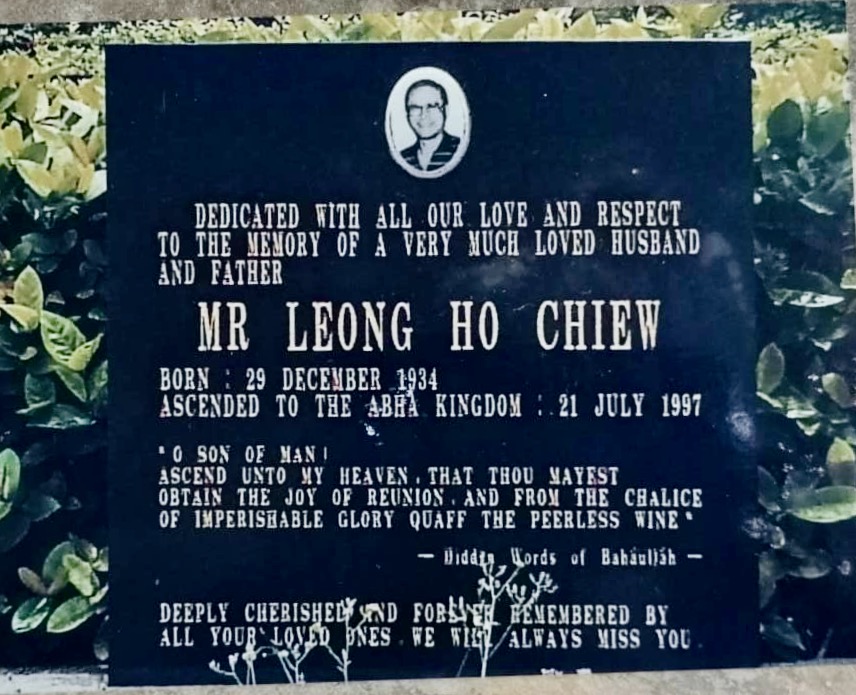
Resting Place of Leong Ho Chiew
A. Manisegaran
31 July 2020
Copyright©bahairecollections.com
USEFUL LINK: Here is the story of Leong Tat Chee, father of Leong Ho Chiew